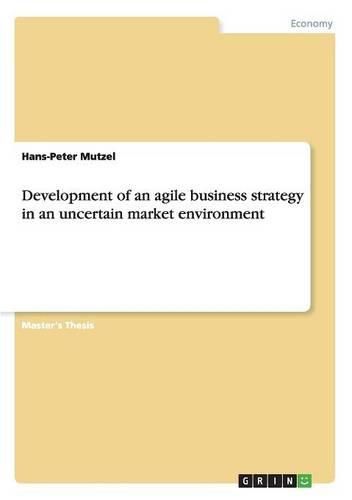Readings Newsletter
Become a Readings Member to make your shopping experience even easier.
Sign in or sign up for free!
You’re not far away from qualifying for FREE standard shipping within Australia
You’ve qualified for FREE standard shipping within Australia
The cart is loading…






Master’s Thesis from the year 2014 in the subject Business economics - Business Management, Corporate Governance, grade: 1, Donau-Universitat Krems (Faculty of Business and Globalization; Department for Management and Economics), course: Danube Professional MBA; Area of Concentration: Strategic Management & Organizational Change, language: English, comment: passed with distinction FIBAA accredited, abstract: Strategic decision-making is a key task for every senior manager of any sized company. Strategic decisions are characterized by highly uncertain conditions. Managing this uncertainty and anticipating the future, is seen as key to success and the measure for being a successful manager. In the opposite direction, if firms fail to anticipate how the future will be, it is then often called bad luck. However, if failing to anticipate the future were correlated with bad luck, this would mean that anticipating the future right should be directly linked with good luck. However, good luck is often ignored and seen as excellent management performance instead. To reduce the influence of luck, this master thesis deals with the different approaches on strategy-formation and decision-making, to identify to what extent they differ in their methodology on how they manage the uncertainty and how they try to get control over the future. The aim is to identify best practice approaches that should lead to better performance on reduced risk and cost.
$9.00 standard shipping within Australia
FREE standard shipping within Australia for orders over $100.00
Express & International shipping calculated at checkout
Master’s Thesis from the year 2014 in the subject Business economics - Business Management, Corporate Governance, grade: 1, Donau-Universitat Krems (Faculty of Business and Globalization; Department for Management and Economics), course: Danube Professional MBA; Area of Concentration: Strategic Management & Organizational Change, language: English, comment: passed with distinction FIBAA accredited, abstract: Strategic decision-making is a key task for every senior manager of any sized company. Strategic decisions are characterized by highly uncertain conditions. Managing this uncertainty and anticipating the future, is seen as key to success and the measure for being a successful manager. In the opposite direction, if firms fail to anticipate how the future will be, it is then often called bad luck. However, if failing to anticipate the future were correlated with bad luck, this would mean that anticipating the future right should be directly linked with good luck. However, good luck is often ignored and seen as excellent management performance instead. To reduce the influence of luck, this master thesis deals with the different approaches on strategy-formation and decision-making, to identify to what extent they differ in their methodology on how they manage the uncertainty and how they try to get control over the future. The aim is to identify best practice approaches that should lead to better performance on reduced risk and cost.